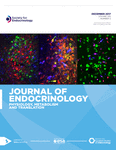Thyroid: biological actions of ‘nonclassical’ thyroid hormones
- Dipartimento di Scienze e Tecnologie Ambientali, Biologiche e Farmaceutiche, Seconda Università degli Studi di Napoli, Via Vivaldi 43, 81100 Caserta, Italy
1Dipartimento di Scienze e Tecnologie, Università degli Studi del Sannio, Via Port'Arsa 11, 82100 Benevento, Italy
- Correspondence should be addressed to A Lanni; Email: antonia.lanni{at}unina2.it
Abstract
Thyroid hormones (THs) are produced by the thyroid gland and converted in peripheral organs by deiodinases. THs regulate cell functions through two distinct mechanisms: genomic (nuclear) and nongenomic (non-nuclear). Many TH effects are mediated by the genomic pathway – a mechanism that requires TH activation of nuclear thyroid hormone receptors. The overall nongenomic processes, emerging as important accessory mechanisms in TH actions, have been observed at the plasma membrane, in the cytoplasm and cytoskeleton, and in organelles. Some products of peripheral TH metabolism (besides triiodo-l-thyronine), now termed ‘nonclassical THs’, were previously considered as inactive breakdown products. However, several reports have recently shown that they may have relevant biological effects. The recent accumulation of knowledge on how classical and nonclassical THs modulate the activity of membrane receptors, components of the mitochondrial respiratory chain, kinases and deacetylases, opened the door to the discovery of new pathways through which they act. We reviewed the current state-of-the-art on the actions of the nonclassical THs, discussing the role that these endogenous TH metabolites may have in the modulation of thyroid-related effects in organisms with differing complexity, ranging from nonmammals to humans.
- Received in final form 13 January 2014
- Accepted 21 January 2014
- Made available online as an Accepted Preprint 24 January 2014
- © 2014 Society for Endocrinology











